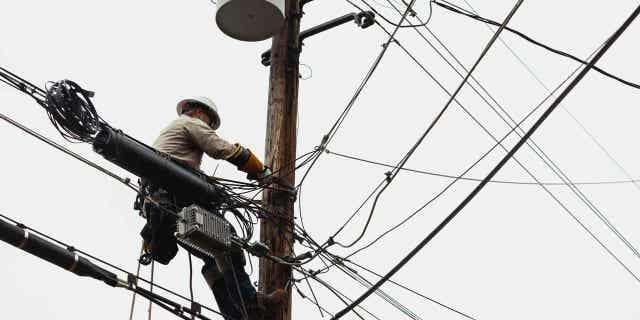

Cronk, who had been in the job since 2018, was the city's first executive to lose his job over the prolonged outages. He will receive about $463,000 in severance.
TX WAS NOT ALERTED WHEN SUSPECT IN A NV STABBING MOVED TO DALLAS AFTER POSTING BAIL, POLICE CLAIMS
The council appointed Jesús Garza, who has previously served as Austin’s city manager, to take Cronk’s job on an interim basis.
The ice storm toppled trees and power lines across the city of more than 1 million residents, causing outages and damage on a scale that Austin officials compared to a hurricane or tornado. Slow restoration efforts left thousands of people dealing with school closures, malfunctioning traffic lights and the financial pinch of spoiled groceries and hotel bills. Power was not fully restored in Austin until nearly two weeks after the outages began.

A lineman works to restore power following a winter storm in Austin, Texas, on Feb 3, 2023. The city manager of Austin was fired following a slow response to the power outages caused by the storm. (Jordan Vonderhaar/Bloomberg via Getty Images)
Cronk had apologized for "any shortcomings in our response" and vowed that the city would implement changes to better respond to future disasters.
TEXAS SENATE GOP PUSHING TO BAN CHINA FROM BUYING PROPERTY
His office did not immediately respond to a message seeking comment Thursday.
Austin Mayor Kirk Watson, a Democrat who took office in January, put in motion meetings that plunged Cronk’s job into jeopardy. In Austin, the city manager is appointed by the mayor and city council, and operates like the chief executive officer of a business.
Austin Energy, the city-run power provider, brought in additional utility crews from across Texas to help tackle the vast number of outages.
For thousands of Austin residents, it was the second time in three years that a February winter storm knocked out their power for days. Although Texas’ catastrophic blackouts in 2021 were the result of a different failure — an ice storm pushing the state’s electric grid to the brink of collapse — the different reason was of little comfort to Austin residents.
